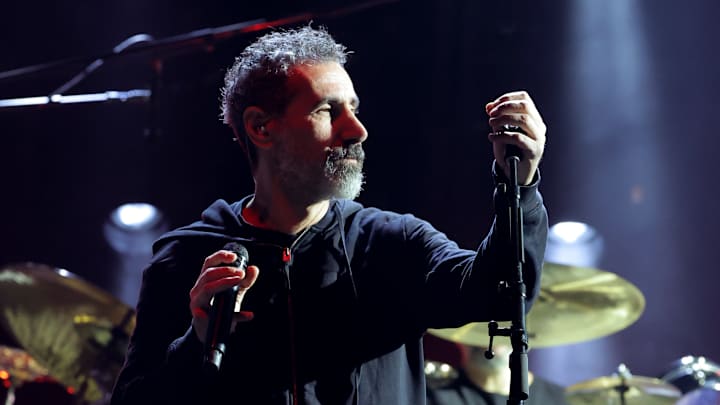As a recent article by NPR notes, protest music once conjured the gentle strumming of Bob Dylan’s guitar or Marvin Gaye’s soulful rhythms. However, new, more forceful sounds emerged overtime, characterized by intense, amplified voices, in the form of rock, punk rock, metal, rap, and any artists in other genres who had something a bit rebellious to say. On that note, System of a Down (SOAD) ascended to prominence as one of the leading metal band of its time, achieving three No. 1 albums in the early 2000s.
Their concerts sold out rapidly, and their music left a resounding impact. Despite their success, the Los Angeles-based band ceased releasing new music after 2005. In his new memoir, Down with the System, lead vocalist Serj Tankian describes the band as:
"Armenian-Americans playing a practically unclassifiable clash of wildly aggressive metal riffs, unconventional tempo-twisting rhythms, and Armenian folk melodies, with me alternately growling, screaming, and crooning lyrics that could pivot from avant-garde silliness to raging socio-political rants in the space of a single line. I'd be the first to admit it: It's not easy listening."
Why did Serj Tankian of System of a Down become an activist?
A crucial part of SOAD’s mission was to educate listeners about the Armenian Genocide, an atrocity the Turkish government has historically denied, and which was formally recognized as genocide by a U.S. president only in 2021, under Joe Biden (though, in a huge chunk of dark irony, Biden himself is accused of supporting an ongoing genocide — and if you have no idea what's being referred to here, congratulations, you might literally live under a rock somewhere, and that's probably some sort of accomplishment).
In an interview with Morning Edition host A Martinez, Tankian shared insights from his memoir and personal history to significantly explain why he became an activist, through music and otherwise.
https://x.com/amartinezla?lang=en
In the interview article, Serj discusses fleeing the Lebanese Civil War as a child:
"I was seven; my brother was four. And I remember when the bombings first started and school was closed, we were crouching in our bedroom from the sounds, the building shaking from bombs falling nearby. And it was just fear. I remember fear, you know? The fear of the unknown as well because as a child you're not cognizant of who's fighting for what reason. You just feel the fear of war, and it's a horrible feeling.
That definitely made me anti-war at a very young age, but as I grew up, it is actually the hypocrisy of the taboo nature of the recognition of the Armenian genocide in a well-known democracy like the United States that ultimately made me an activist."
On his family’s connection to the Armenian Genocide
"My ancestors, my great grandparents – perished in the genocide. My grandfather, Stepan Eytan, was born in the early 1900s in a small village called Efkere in the Gesaria area of Turkey, which used to be historical Armenia. Turkey used to have at least 3 million Armenians, if not more. We were the largest Christian minority in the country. During the First World War in 1915, there was a systematic, organized genocide conducted by the government of the Ottoman Empire at the time. And my grandfather is a survivor of that genocide. He told us his story of survival.
My grandfather lived to the age of 93, 94 (we're not exactly sure of his age because of lost documents). We know his story more than our other grandparents, so that was a gift for us. I wanted him to know that before he [died], we were fighting for his memory, the memory of his family, his whole generation, and what he had fought for during his life."
Isn't it obvious?
Ultimately, with this sort of background, it's perfectly understandable why someone would become an activist against the types of things that traumatized him as a child. Right? In fact, perhaps a better question is: Why aren't more people activists against these types of things? Well, I think we know some of the reasons why, because there is plenty to fear out there for people who speak up against what they feel is wrong.
So, even though music itself won't bring about the change the world needs, it is definitely still there for those with ears capable of hearing what is being said. Granted, it's not always clear what an SOAD song is talking about, so that makes any such article a bit complicated, but what the hell? At least the band is trying to say something, and they occasionally do successfully get some messages across.
